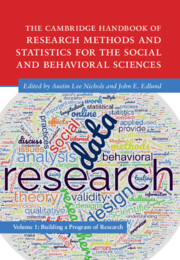 The Cambridge Handbook of Research Methods and Statistics for the Social and Behavioral Sciences
The Cambridge Handbook of Research Methods and Statistics for the Social and Behavioral Sciences from Part V - Tips for a Successful Research Career
Published online by Cambridge University Press: 25 May 2023
Peer review supports decisions related to publications, grant proposals, awards, or personnel selection. Independent of the specific occasion, we propose validity as a chief evaluation criterion for reviews. While applicable to all occasions, the principles of validity-oriented quality control are particularly suited for journal reviews. Beyond evaluating validity and the scientific potential of a given piece of research, we address how peer reviewing serves important functions and is accountable for the growth of science at a more superordinate level. We also provide guidelines and concrete recommendations for how a good peer review may serve these functions. Good peer review, thereby, fosters both the advancement of scientific research and the quality, precision, and sincerity of the scientific literature. The end of the chapter is devoted to a core set of good reviewer practices, conceived as an essential feature of academic culture.
To save this book to your Kindle, first ensure [email protected] is added to your Approved Personal Document E-mail List under your Personal Document Settings on the Manage Your Content and Devices page of your Amazon account. Then enter the ‘name’ part of your Kindle email address below. Find out more about saving to your Kindle.
Note you can select to save to either the @free.kindle.com or @kindle.com variations. ‘@free.kindle.com’ emails are free but can only be saved to your device when it is connected to wi-fi. ‘@kindle.com’ emails can be delivered even when you are not connected to wi-fi, but note that service fees apply.
Find out more about the Kindle Personal Document Service.
To save content items to your account, please confirm that you agree to abide by our usage policies. If this is the first time you use this feature, you will be asked to authorise Cambridge Core to connect with your account. Find out more about saving content to Dropbox.
To save content items to your account, please confirm that you agree to abide by our usage policies. If this is the first time you use this feature, you will be asked to authorise Cambridge Core to connect with your account. Find out more about saving content to Google Drive.